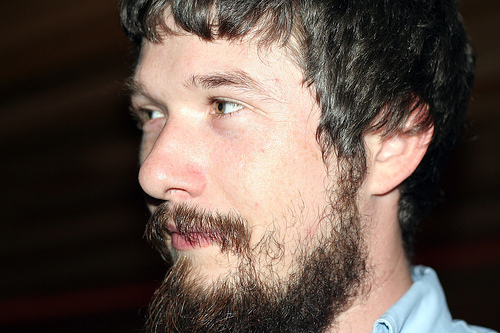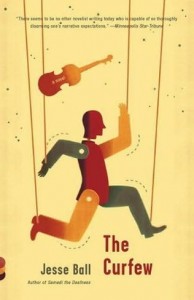Author Spotlight
“Last April I hurt my knee doing Brazilian Jiu Jitsu” : 6 Questions W/ Jesse Ball

[Jesse Ball’s latest novel, The Curfew, will be released from Vintage on June 14th. Last month Shane Jones caught up with Jesse about the new book via email. – ed.]
SJ: When I first interviewed you back in 2007 we spoke a little about how fast you write your books (some in several weeks) and I’d like to go back to that discussion. Specifically, how fast your books feel to a reader (the latest feels even faster than your first two books). I literally could not stop reading THE CURFEW because it felt like I was being pulled along, my eyes kind of racing over the words. Is this something you consciously try to implore in your novels? Was THE CURFEW written in the same short-time/style as the others?
JB: Even more quickly, actually.
I feel very strongly the burden that a writer ought to tell a tale and that the writer should do it so properly and well that the reader forgets himself or herself. There are many other things I do (or try to do), but that is the first.
SJ: Do you ever worry that the books will come across “too fast” or like sketches? The reason I ask is because (and I could be wrong here) the first novel you wrote is THE WAY THROUGH DOORS, then SAMEDI, and now THE CURFEW. Your publisher decided to publish SAMEDI first. And with each one (as you wrote them) they have gotten shorter, simpler, and seem less focused on visual imagery and these kind of surreal happenings, and more focused with telling a story. I liked THE CURFEW a lot, but it just feels different, restrained in a way. Was there any editing at all? An attempt to expand or make things stronger? Do you drive your editor mad?
JB: Well, you could say that I have gotten better at knowing what I need to do. In the case of The Curfew it is about creating shuddering parallels between worlds peopled by characters for whom (one hopes) the reader feels affection, these worlds being dreamed or imagined by the characters themselves.
I wouldn’t agree that The Curfew is at all simpler than the two previous — although it may be read more simply. But that’s the intention — to allow someone to read for story only, should they choose, and to reward them richly.
 SJ: Maybe simpler is the wrong word. I guess I felt like it was maybe more minimal, where a work like WAY THROUGH DOORS felt very maxed-out with tons of stuff going on. Of course it’s unfair to compare two works really, so let me ask something entirely different. I don’t know where I heard this, but is it true that you’re really into boxing and fighting? And that you have a trained mixed martial arts person come to your house to fight on a weekly basis?
SJ: Maybe simpler is the wrong word. I guess I felt like it was maybe more minimal, where a work like WAY THROUGH DOORS felt very maxed-out with tons of stuff going on. Of course it’s unfair to compare two works really, so let me ask something entirely different. I don’t know where I heard this, but is it true that you’re really into boxing and fighting? And that you have a trained mixed martial arts person come to your house to fight on a weekly basis?
JB: Last April I hurt my knee doing Brazilian Jiu Jitsu, so I have been out of commission since then, however I just had an operation to fix the knee, and will be back at it soon.
I have always been obsessed with contests — both physical, as in boxing, wrestling, etc, or mental, as in chess or go. I like when fighters or chess players demonstrate willpower. It is an underappreciated quality.
SJ: THE CURFEW is largely about a father and daughter and I was wondering if any of the book is based on your own relationship with your daughter. For example, the game played between William and Molly was one of my favorite scenes and it seemed possible this came from an actual game played between two people. Also, if Chicago became the city described in the book and your wife went missing, would you risk going out to find her and leave your daughter behind?
JB:
1. Yes. Very autobiographical. Riddle games happen in our house from time to time.
2. Yes, of course. I would have to find her!
SJ: I read part of the book as the idea that the fantasy world(the play) is actually more important and seductive than the actual world(the city). That is, Molly needs the play to survive. Could this be a metaphor for the writing life? The idea of escaping from “the real world” into an imaginary world as survival? Are you sick of this interview?
JB: I shouldn’t say.
SJ: It’s late at night and you’re walking through the city. An interviewer from an online journal with a small but respectable readership approaches you in a violent manner (may or may not be holding a small cheese knife). How do you handle the situation?
JB:
*produces fine cheese*
*sets it on the ground*
*vanishes*
* * *
Jesse Ball lives in Chicago. The Curfew will be published in June.
Shane Jones lives in Albany New York and blogs at ivomiticecubessowhat.tumblr.com. His next book, Daniel Fights A Hurricane, will be published by Penguin early next year.
Tags: jesse ball, shane jones, The Curfew

I just previewed THE WAY THROUGH DOORS and wanted to read more once some of the pages were missing and I wasn’t quite sure why. Something about the writing reminded me of Horace McCoy.
good interview. nice work shane.
Nice interview guys.
[…] (Imagen extraída de htmlgiant.com) […]
[…] Night Moves, and “experimental”/”difficult” fiction, including works by Ben Marcus and Jesse Ball. But that’s not all they did. HMTLGIANT also covered more overtly “normal” works, like Bright […]